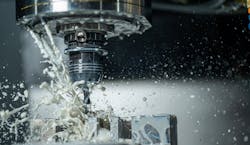From incredibly short drug development cycles to cutting-edge mRNA vaccines, the pharma industry’s success in combatting COVID-19 bodes well for future medical challenges.
But one underrated aspect of the vaccine success story has been the widespread use of computer numerical control (CNC) machined parts to produce high-end components.
Pharma’s growth is expected to continue at a breakneck pace — the worldwide industry has been projected to grow by as much as 160 percent between 2017-2030.
How does CNC machining factor in? Both the production and R&D sides of the pharma industry rely on high-end precision equipment — equipment that can be produced most efficiently via CNC machine tools.
Equipment challenges
Manufacturing equipment for the pharma industry requires two things. First, equipment manufacturers and CNC machine shops need to meet exacting specifications with tight tolerances. Second, they need to conform to various regulatory standards.
To meet these challenges, more and more pharma companies are working directly with CNC manufacturers. This allows companies to get exactly the equipment they need, along with any necessary customization. If needed, CNC manufacturers can even produce custom parts to repair or replace worn parts on older machinery.
Individual tolerances on pharma equipment can also be impressively tight — as little as 0.0002” in some cases. Between the need to conform to industry-wide standards and to produce equipment to incredibly narrow tolerances, pharma equipment manufacturers require the most precise machine tools available.
CNC machine tools are capable of just such precision. CNC manufacturers can produce individual parts or the components necessary to produce pharma lab equipment or production equipment.
For the pharma industry, the latter category is arguably the most important. Pharma production relies on specialized equipment — such as cooling towers, dryers, granulators, tablet presses and coating machines. The industry also uses a range of inspection equipment to ensure quality and consistent production. All of these machines are produced using CNC processes and rely on machine tools.
CNC benefits
Beyond the precision mentioned, CNC provides a number of other benefits to the pharma industry:
- Material flexibility: CNC machining processes work with nearly any material, from advanced plastics to solid metal blocks.
- Design innovation: Integrating CAD/CAM design allows CNC machining companies to work with clients to produce unique, specialized equipment.
- Advanced capabilities: Five-axis machine tools are capable not only of greater precision but also of producing more intricate and complicated parts. This advanced capability becomes especially important as pharma develops new applications and processes.
Using CNC manufacturing techniques allows large and small companies to produce flexible, adaptable, specialized equipment to exacting standards. Since any company can apply for the appropriate ISO certifications to produce pharma equipment, pharma companies can turn to a huge range of producers to meet growing demand.
A future in pharma
CNC technology applies to an ever-increasing number of pharma manufacturing tools. Future applications of CNC technology will open even more possibilities. 3D printing, which uses similar technology to CNC programming, could be used in conjunction with CNC machining to produce advanced equipment more efficiently.
These projections are based only on current CNC capabilities; the advent of entirely new technologies, like artificial intelligence, could dramatically increase both the production abilities and the technical precision of future CNC machinery.
The growing demand for pharma products and the increased budget for R&D will require greater and greater reliance on CNC machining processes to meet the need for precise, accurate and specialized pharma equipment.
Peter Jacobs is the Senior Director of Marketing at CNC Masters, with over 10 years of experience specializing in CNC Machining.
Top image courtesy of Daniel Smyth via Unsplash.com.
